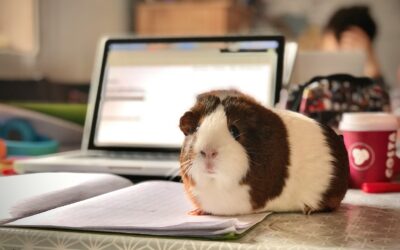If you’re new to guinea pigs and their care, it can be daunting to figure out what your furry friend can and can’t eat. This herbivorous species is pretty specific about its diet, as its digestive system isn’t adapted to a wide range of different foods. So what should your cavy be eating? Which of the foods you’ve got in your fridge are suitable for it and which aren’t?
To make choosing your guinea pig’s next meal a little easier, we’ve compiled a list of 13 fruits and veggies and whether they are safe or not.
13 safe foods for guinea pigs
Can guinea pigs eat apples?
Yep! Apples are much too sugary to be a staple food for your cavy, but they are absolutely fine as a treat. You might be able to use tiny apple pieces as a compelling treat during training, because most guinea pig owners do report that theirs love this fruit.
Can guinea pigs eat strawberries?
Yes. Although like apples, strawberries are too sugary to feed more than a little bit occasionally, they do contain a lot of vitamin C. As guinea pigs’ bodies aren’t capable of producing vitamin C like some other rodents, this is always a plus.
If you’re preparing strawberries, you could always opt not to give your cavy the fruit, but offer the tops instead. They’re much healthier!
Can guinea pigs eat grapes?
Also a yes here, though again, this good is meant to be an occasional treat and not a staple. We’ve seen a bunch of websites claim that you should only offer red grapes because the green ones are more sugary, but haven’t found much to prove that this is true. Red grapes are higher in antioxidants, but in terms of sugar, both kinds unfortunately rank pretty high.
Can guinea pigs eat celery?
Yes, guinea pigs can eat both celery stems and leaves. This veggie is high in fiber and not as sugary as fruits, making it a great choice. We’ve seen concerns about the calcium oxalate content in celery (this compound can lead to bladder stone formation), but compared to many other vegetables, it’s actually not that high.

Can guinea pigs eat bananas?
Yes, some banana is fine as a treat for your guinea pig. As with all fruits, don’t overdo it, as the sugar content is pretty high.
Can guinea pigs eat carrots?
Carrots are perfectly safe for your guinea pig. That being said, they are one of those veggies that’s just a bit too high in sugar to form a part of your furry friend’s daily diet. A good solution is to give your cavy the carrot greens rather than the root! They love carrot tops and it’s a much healthier option.
Can guinea pigs eat cabbage?
Technically yes, but it’s not our favorite choice. Cruciferous vegetables like cabbage can be fed occasionally in small quantities, but are known to cause bloat in guinea pigs if you overdo it.
Can guinea pigs eat lettuce?
Sure, almost all leafy greens make a great option for your cavy. When it comes to lettuce, the greener, the better: iceberg is almost 100% water and doesn’t have much nutritional value, while darker green or even red types are full of essential nutrients. Something like romaine lettuce is a great option!
Can guinea pigs eat mango?
Sure, a small piece of fresh mango (not canned or dried) here and there is alright. Just don’t make it a daily thing.
Can guinea pigs eat broccoli?
Sure, although it’s probably best to feed broccoli in moderation. Like cabbage, this is a cruciferous vegetable, and it may cause bloating if you overfeed. Some sources recommend against broccoli due to its supposedly high calcium oxalate content, but it’s actually much lower in oxalates than many other veggies, so that’s not a concern.
Can guinea pigs eat cantaloupe?
Yes, but the general fruit rule applies: feed cantaloupe sparingly please.
Can guinea pigs eat tomatoes?
Yes, ripe tomatoes and their seeds are fine for your guinea pig. Just avoid the stems and leaves. The foliage and other green bits of nightshades like tomatoes (as well as cucumber, eggplant, peppers and more) contain various irritating and toxic compounds, after all.
Can guinea pigs eat watermelon?
Yes, your cavy can eat watermelon. They tend to love the juicy and sweet flesh, but did you know they can also have the rind? Just make sure you buy organic, as otherwise, the rind may contain pesticides. It’s lower in sugar and therefore better for your guinea pig than the fruit itself!

4 Foods toxic to guinea pigs
Although as you’ve hopefully concluded from the above, your guinea pig can eat all sorts of kitchen scraps, not everything is safe. Their digestive systems are highly specialized, meaning there are many foods they can’t have. A few of the most common foods to avoid include:
- Avocado: toxic to many animals, there is some discussion about its effect on guinea pigs. In any case, since avocado is very high in fat, it’s best to just feed something else!
- Onion & other alliums: these are unfortunately all on the no-go list. This includes garlic, chives, scallions, leek and the like.
- Dairy: nope, no animal products please! Guinea pigs can’t digest items like dairy (as well as meat, eggs and other things derived from animals).
- Potato: too high in carbohydrates and various other compounds that can upset a cavy’s sensitive stomach.
In addition to these toxic foods, you should avoid feeding your guinea pig grains and cereals, as well as nuts and seeds (like sunflower seeds). It also goes without saying that they should not be fed meat, nor processed foods for humans (both salty and sweet).
Conclusion
Although the base of your guinea pig’s diet should consist of unlimited access to Timothy hay supplemented with vitamin C-enhanced guinea pig pellets, there is plenty of room for variation. Fruit is great for special occasions or as a training treat, while various types of veggies ensure your cavy gets all the (micro)nutrients it needs.







